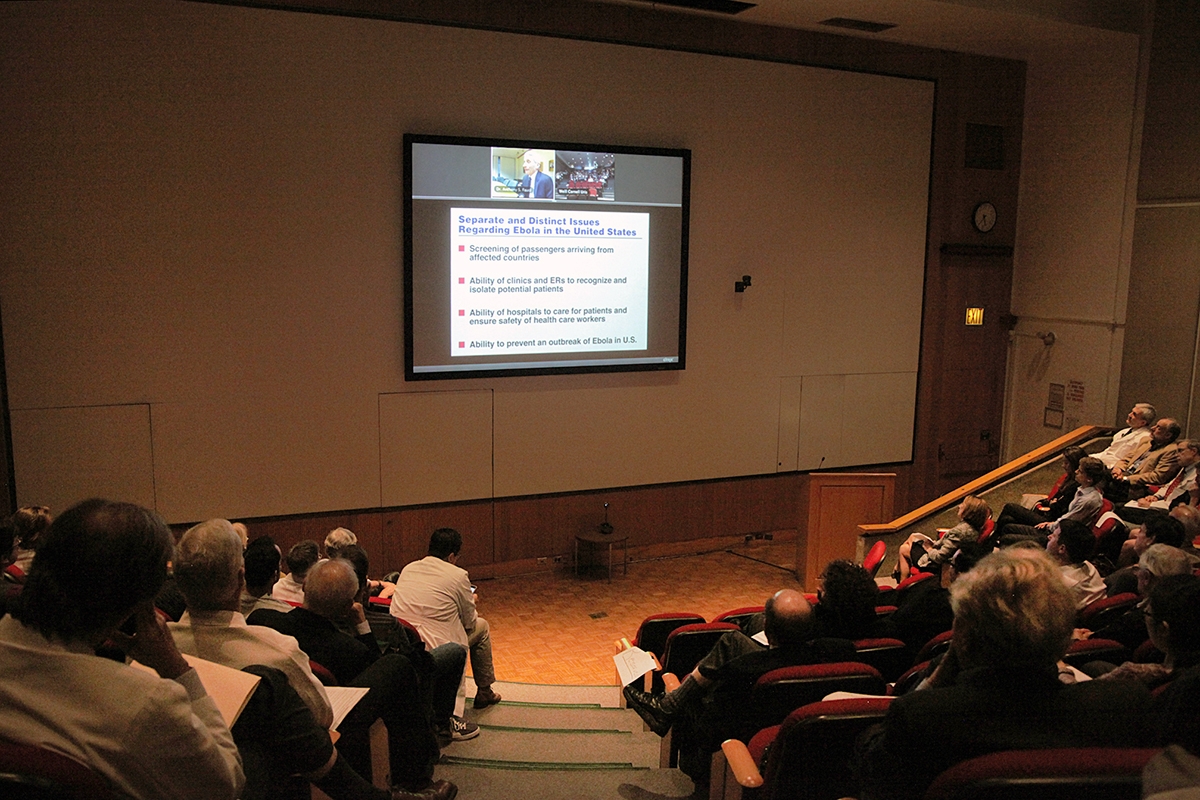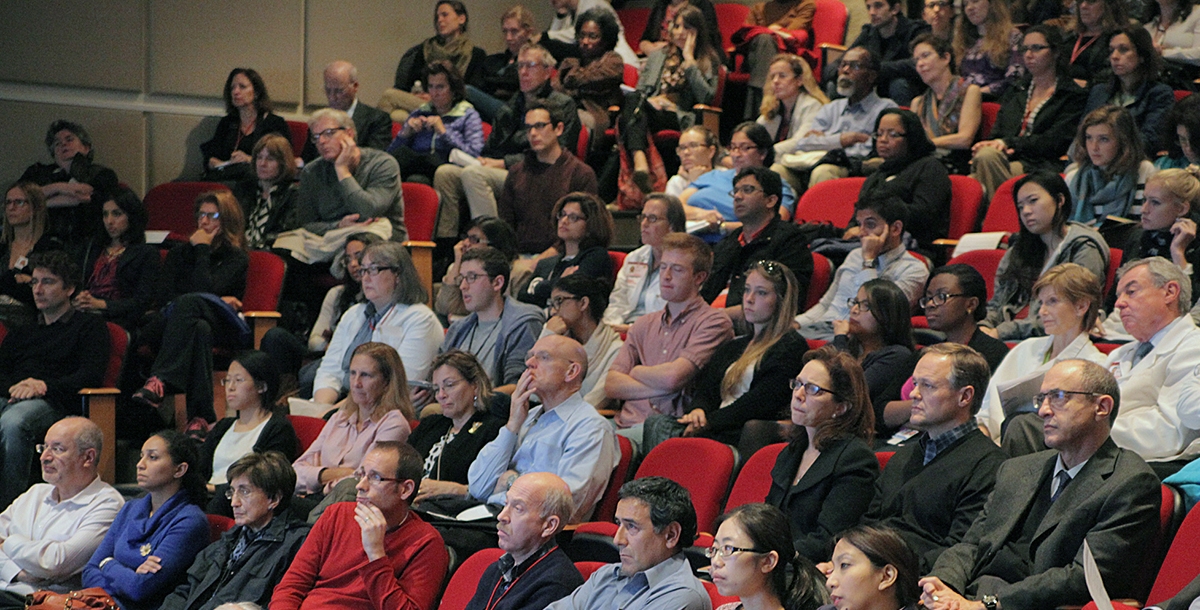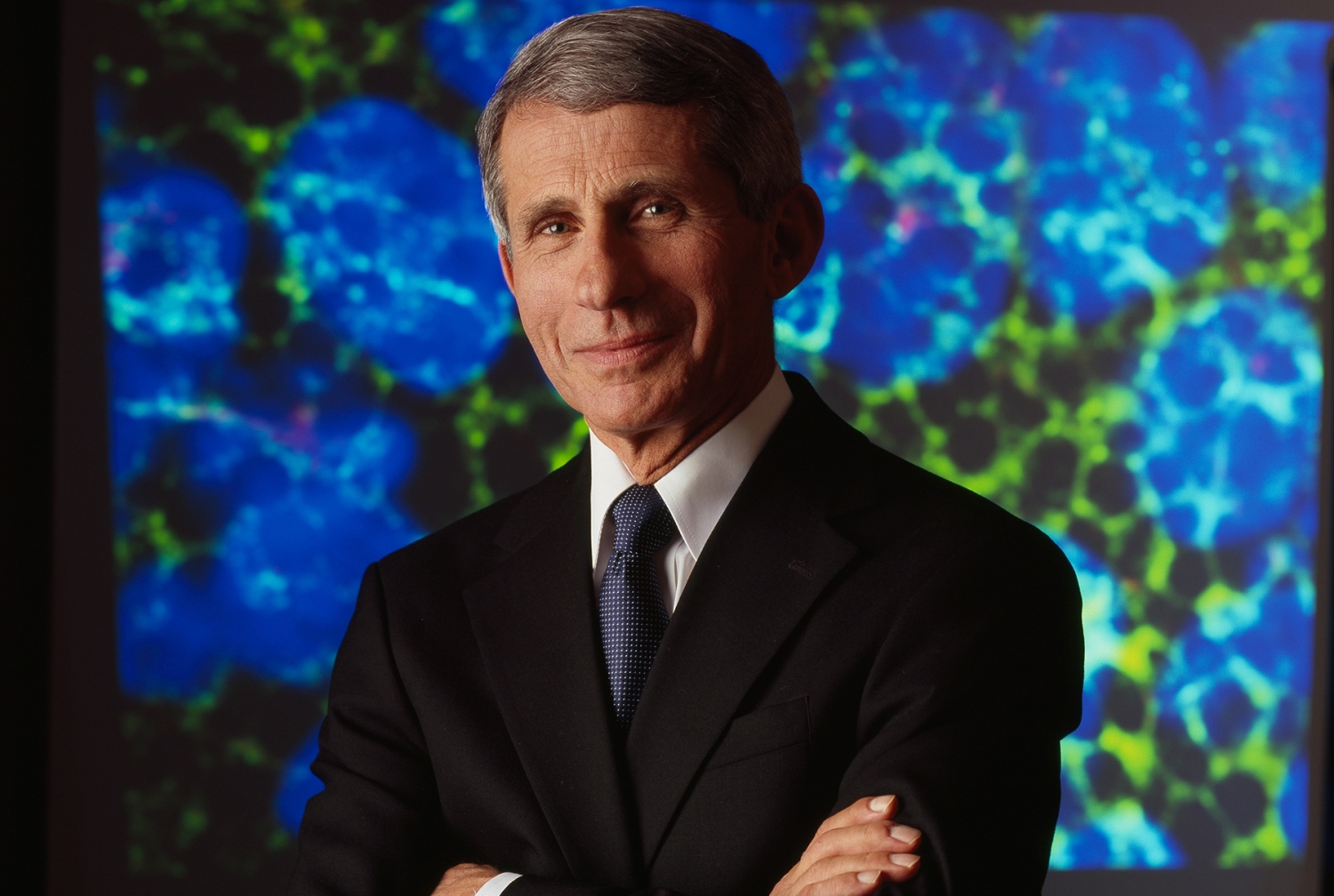The Ebola epidemic raging in West Africa is a global crisis requiring the mobilization of countries around the world to stop the deadly virus in its tracks, National Institute of Allergy and Infectious Diseases Director Dr. Anthony Fauci '66 told a packed crowd in Uris Auditorium.
"We've got to get the realization among all of the countries involved that this will impact them, not only because of an exported case, but the domino effect of if it explodes beyond control," Dr. Fauci said by live videoconference on Oct. 21 as the guest lecturer for Weill Cornell's Global Health Grand Rounds. "The big hitters have to step up to the plate and put in serious resources.
"Serious resources doesn't mean signing a resolution that this is an important problem,” said Dr. Fauci during his lecture "Ebola in West Africa: The Perfect Storm," sponsored by the Department of Healthcare Policy and Research. "Serious resources means thousands of beds, healthcare workers, engineering — the kinds of things we are trying to do with [the U.S.] military and our volunteers."
There have been 24 Ebola outbreaks since 1976, but none more severe than the current epidemic, which was first recognized in rural Guinea in March and spread to neighboring Liberia and Sierra Leone, infecting more than 9,000 people and causing nearly 5,000 deaths. Poor health infrastructure, compounded by a lack of health professionals, limited coordination between the countries' governments, and frequent travel across porous borders incited what Dr. Fauci described as a "perfect storm” that, if not thwarted, could lead to more than 1 million Ebola cases in 2015.
The outbreak is "an extraordinary but frightening textbook of epidemiology," he said. "If you have a linear response to an exponential epidemic, the epidemic will always win."
Though Ebola can only be transmitted by direct contact with an infected person's bodily fluids, the species of the virus rampant in West Africa has a particularly high mortality rate of 50 to 90 percent. The virology is well understood — there are five species of Ebola, it has a 2- to 21-day incubation period and is highly unlikely to mutate to become airborne. Experts also know the best way to contain and end any outbreaks: sound public health measures, including but not limited to care and isolation of patients with Ebola and tracking people with whom they have come in contact. Only those who are symptomatic are contagious.

Dr. Anthony Fauci gave a the Grand Rounds lecture "Ebola in West Africa: The Perfect Storm," on Oct. 21 by videoconference. All photos: Ira Fox
"Contact tracing is critical to whether there will be an outbreak," Dr. Fauci said. "You need an army of people — they don't need to be doctors or nurses."
That's precisely how the 24 previous outbreaks were contained, Dr. Fauci said, and why there won't be a large outbreak in the United States. The Centers for Disease Control and Prevention has been monitoring nearly 200 people who came into contact with a Liberian patient who traveled to the United States and later died, Thomas Eric Duncan, as well as two nurses who cared for Duncan and were infected with Ebola. Nina Pham is being treated by Dr. Fauci and, he said, three other Weill Cornell graduates at the NIH's clinical studies unit in Maryland. Amber Vinson is being treated at Emory University Hospital in Atlanta.
Heralded as a turning point in the U.S. Ebola scare, a group of 40 people who had contact with Duncan were taken off a watch list on Oct. 20, having passed the 21-day monitoring period. While many are cautiously optimistic, virologists and public health experts are now taking stock of some of the missteps that led to the nurses getting sick, and implementing new safety measures to prevent future transmission.

Dr. Fauci lectured in front of a packed crowd in Uris Auditorium.
"It was bad for us as a nation, bad for us as a hospital system, the first step up to the bat — a swing and a miss," Dr. Fauci said. "It wasn't recognized and it could have been worse than it was."
The key to ending the epidemic and preventing cases beyond West Africa, Dr. Fauci said, is a robust disaster-relief response from the international community. After an initial response from health and humanitarian nonprofits, the United States announced last month that it was sending more than 3,000 troops to the region to help set up 17 100-bed Ebola treatment units, build a 25-bed hospital for healthcare workers treating Ebola, and coordinate response planning, operations and logistics.
The NIH and its collaborators also have more than a dozen experimental Ebola vaccines and drugs in the pipeline, several of which have entered clinical testing in the United States, Europe and Africa. Among these is a vaccine candidate developed at the NIH based on a type of chimpanzee cold virus, called chimp adenovirus type 3 (ChAd3). The adenovirus is used as a carrier, or vector, to deliver segments of genetic material derived from Ebola virus to induce an Ebola-specific immune response.
The epidemic has produced sleepless nights for Dr. Fauci. The last time he'd pulled so many consecutive all-nighters, he said, "I was on the old H5 ward during Christmas" during his training in what was then New York Hospital.
"There may be another case in the United States; that's entirely conceivable," Dr. Fauci said. "But let's not take our focus away from the fact that the best way to prevent that person from walking into our ER is to end the epidemic in West Africa. That's where the source [of the virus] is, and that's where the effort should be."

